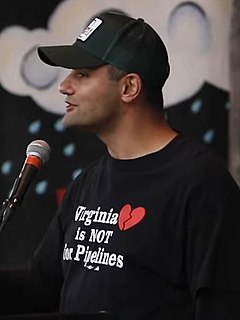A Quote by Matt Haig
Teenagers are philosophers. They are thinking about the big things like existence and identity at a time when their identities are changing so fast.
Related Quotes
At first I was thinking of it as superheroes who happened to be teenagers. Then I realized, no, I'm writing about teenagers who happen to be superheroes. Thinking like that changed everything for me. I started approaching the stories through the characters' core emotions, rather than leading with the superpowers.
You bring up identity politics and I think that this is really causing a divide in the American left where we're rallying too much around identities. We should celebrate our heritage, we should organize by identity, but we shouldn't advocate and push for certain identities. We shouldn't talk about women suffrage, or plight of Muslims, or refugees; we should talk about our common American values.
The identity of just one thing, the "clash of civilization" view that you're a Muslim or a Hindu or a Buddhist or a Christian, I think that's such a limited way of seeing humanity, and schools have the opportunity to bring out the fact that we have hundreds of identities. We have our national identity. We have our cultural identity, linguistic identity, religious identity. Yes, cultural identity, professional identity, all kinds of ways.
First of all, a giant corporation probably shouldn't be being hacked by teenagers. I put that on the corporation, not the teenagers. Teenagers are going to do what teenagers are going to do - rebelling. But if they're able to hack a big corporation, that seems like the corporation should be better at security.
I think one reason is that philosophers are more insecure to speak accessibly because non-philosophers are skeptical that philosophers have any special expertise. After all, all people - not just philosophers - have attitudes and points of view on various philosophical questions, and they rather resent being told that there are professionals who can think about these things better.
A false identity is any lie that contradicts our God-given identities through Scripture. These false identities can be created by ourselves because of sin in our lives, choices made, or wrong turns taken and the regret, guilt, and shame that follows. Other false identities are handed to us by outside sources, maybe a damaging word spoken to us by someone or a childhood of abuse. However, not all false identities are negative on the surface, such as successful, attractive, wealthy, athletic, or talented. But even those identities can become false when we place too much of our weight on them.
When I talk to people who have teenagers now, their rooms are filled with screens. There are their phones and their DVD players and TVs and all these things to produce distractions for them, and I think it would be hard to find the time to create something. I think that's really changing something about adolescence.
It's hard enough to be a middle-school kid, because you're dealing with so many facets of your identity - you're changing socially, you're changing physically, you're changing emotionally, everything is in flux, and to put race on top of that as well and have to figure out your racial identity is extremely hard.






































